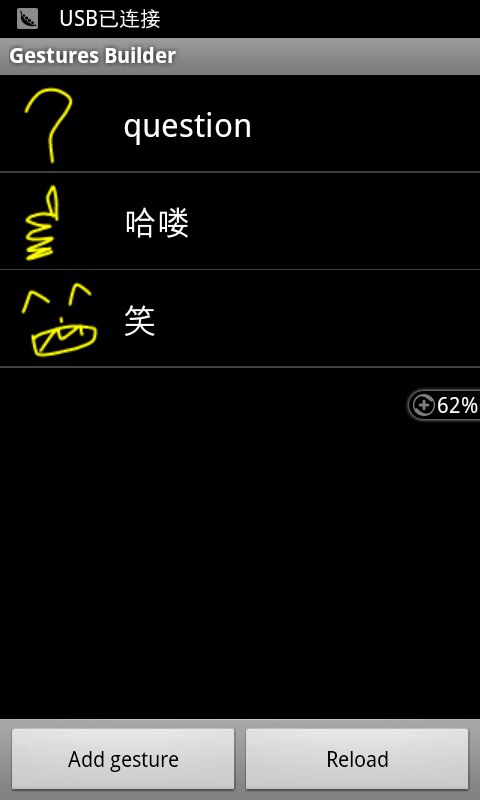android手势简单认识...
1. 接触接触屏一刹那,触发一个MotionEvent事件。
2. 该事件被OnTouchListener监听,在其onTouch()方法里获得该MotionEvent对象。
3. 通过GestureDetector(手势识别器)转发次MotionEvent对象至OnGestureListener。
4. OnGestureListener获得该对象,听根据该对象封装的的信息,做出合适的反馈。
这个顺序可以说就是手势交互的原理,下面一同来了解一下MotionEvent、GestureDetector和OnGestureListener。
MotionEvent: 这个类用于封装手势、触摸笔、轨迹球等等的动作事件。其内部封装了两个重要的属性X和Y,这两个属性分别用于记录横轴和纵轴的坐标。
GestureDetector: 识别各种手势。
OnGestureListener: 这是一个手势交互的监听接口,其中提供了多个抽象方法,并根据GestureDetector的手势识别结果调用相对应的方法。
参考代码如下
package hfut.gmm;
import java.util.ArrayList;
import android.app.Activity;
import android.gesture.Gesture;
import android.gesture.GestureLibraries;
import android.gesture.GestureLibrary;
import android.gesture.GestureOverlayView;
import android.gesture.Prediction;
import android.gesture.GestureOverlayView.OnGesturePerformedListener;
import android.os.Bundle;
import android.util.Log;
import android.view.ContextMenu;
import android.view.GestureDetector;
import android.view.Menu;
import android.view.MenuItem;
import android.view.MotionEvent;
import android.view.View;
import android.view.Window;
import android.view.ContextMenu.ContextMenuInfo;
import android.view.GestureDetector.OnGestureListener;
import android.view.View.OnTouchListener;
import android.view.ViewGroup.LayoutParams;
import android.view.animation.AnimationUtils;
import android.widget.ImageSwitcher;
import android.widget.ImageView;
import android.widget.Toast;
import android.widget.ViewSwitcher.ViewFactory;
public class MainActivity extends Activity implements ViewFactory, OnTouchListener, OnGestureListener {
/** Called when the activity is first created. */
private ImageSwitcher imgswitcher;
private Integer[] pics = { R.drawable.pic_one, R.drawable.pic_two,
R.drawable.pic_three, R.drawable.pic_four, R.drawable.pic_five,R.drawable.pic_six,
R.drawable.pic_seven
};
int index;
private boolean success;
private GestureDetector detector ;
GestureLibrary library;
@Override
public void onCreate(Bundle savedInstanceState) {
super.onCreate(savedInstanceState);
this.requestWindowFeature(Window.FEATURE_NO_TITLE);
setContentView(R.layout.main);
detector=new GestureDetector(this);
imgswitcher=(ImageSwitcher)this.findViewById(R.id.imageSwitcher1);
imgswitcher.setFactory(this);
imgswitcher.setInAnimation(AnimationUtils.loadAnimation(this,
android.R.anim.fade_in));
imgswitcher.setOutAnimation(AnimationUtils.loadAnimation(this,
android.R.anim.fade_out));
imgswitcher.setImageResource(pics[2]);
imgswitcher.setOnTouchListener(this);
imgswitcher.setLongClickable(true);
detector.setIsLongpressEnabled(true);//Set whether longpress is enabled
this.registerForContextMenu(this.findViewById(R.id.textView1));
library = GestureLibraries.fromRawResource(this, R.raw.gestures);
//加载手势库
success = library.load();
//找到手势识别控件
GestureOverlayView gestureView = (GestureOverlayView)this.findViewById(R.id.gestures);
gestureView.addOnGesturePerformedListener(new GestureListener());
}
//手势识别监听...
class GestureListener implements OnGesturePerformedListener {
@Override
public void onGesturePerformed(GestureOverlayView arg0, Gesture gesture) {
// TODO Auto-generated method stub
if(success)
{
//从手势库中查找匹配的手势,最匹配的记录会放在最前面
ArrayList<Prediction> predictions = library.recognize(gesture);
if(!predictions.isEmpty())
{
Prediction prediction = predictions.get(0);
//Log中显示出匹配程度
Log.i("Infor", "score:"+ prediction.score);
//匹配程度大于30%
if(prediction.score>3)
{
//这是关闭的手势
if("question".equals(prediction.name))
{
Toast.makeText(MainActivity.this, "当前手势:question", Toast.LENGTH_LONG).show();
}
}
}
}
}
}
public void nextgirl(){
index++;
imgswitcher.setImageResource(pics[index%pics.length]);
}
public void pregirl(){
index--;
if(index==-1)
index=pics.length-1;
imgswitcher.setImageResource(pics[index%pics.length]);
}
@Override
public View makeView() {
// TODO Auto-generated method stub
ImageView i = new ImageView(this);
i.setBackgroundColor(0xFF011000);
i.setScaleType(ImageView.ScaleType.FIT_XY);
i.setLayoutParams(new ImageSwitcher.LayoutParams(
LayoutParams.WRAP_CONTENT, LayoutParams.WRAP_CONTENT));
return i;
}
@Override
public boolean onTouch(View arg0, MotionEvent arg1) {
// TODO Auto-generated method stub
detector.onTouchEvent(arg1); //将motionEvent事件添加进GestureDetector进行监听处理
return true;
}
@Override
public boolean onDown(MotionEvent arg0) {
// TODO Auto-generated method stub
Log.d("Infor", "onDown被调用...");
return false;
}
@Override
public boolean onFling(MotionEvent e1, MotionEvent e2, float velocityX,
float velocityY) {
// TODO Auto-generated method stub
if(velocityX<0)
nextgirl();
else if(velocityX>0)
pregirl();
Log.d("Infor", "onFling被用调用");
return false;
}
@Override
public void onLongPress(MotionEvent arg0) {
// TODO Auto-generated method stub
Log.d("Infor", "长按");
}
@Override
public boolean onScroll(MotionEvent arg0, MotionEvent arg1, float arg2,
float arg3) {
// TODO Auto-generated method stub
Log.d("Infor", "onScroll被用调用");
return false;
}
@Override
public void onShowPress(MotionEvent arg0) {
// TODO Auto-generated method stub
Log.d("Infor", "onShowPress被用调用");
}
@Override
public boolean onSingleTapUp(MotionEvent arg0) {
// TODO Auto-generated method stub
Log.d("Infor", "onSingleTapUp被用调用");
return false;
}
//上下文菜单....
public boolean onContextItemSelected(MenuItem item) {
// TODO Auto-generated method stub
return super.onContextItemSelected(item);
}
@Override
public void onCreateContextMenu(ContextMenu menu, View v,
ContextMenuInfo menuInfo) {
// TODO Auto-generated method stub
super.onCreateContextMenu(menu, v, menuInfo);
menu.add(0,Menu.FIRST, 0, "菜单");
}
}xml文件:
<?xml version="1.0" encoding="utf-8"?>
<LinearLayout xmlns:android="http://schemas.android.com/apk/res/android"
android:orientation="vertical"
android:layout_width="fill_parent"
android:layout_height="fill_parent"
android:weightSum="1">
<TextView android:text="TextView" android:layout_height="wrap_content" android:id="@+id/textView1" android:layout_width="match_parent"></TextView>
<ImageSwitcher android:layout_width="match_parent" android:id="@+id/imageSwitcher1" android:layout_height="wrap_content" android:layout_weight="0.61"></ImageSwitcher>
<!--添加手势识别的控件 -->
<android.gesture.GestureOverlayView
android:layout_width="fill_parent"
android:layout_height="0dip"
android:gestureStrokeType="multiple"
android:id="@+id/gestures"
android:layout_weight="1.24"/>
</LinearLayout>
上述代码主要实现两个功能:
1、手势交互功能
通过一个imageSwitcher对它进行左右滑动切换图片从而可以实现类似翻页功能....
2、手势识别功能(红体字标识)
通过使用Android SDK samples里面自带的GestureBuilder建立手势库(位置:android-sdk-windows/samples/android-8/GestureBuilder),运行就可以使用GestureBuilder建立手势库,生成的手势库文件在SCDard根目录下,默认文件名称为:gestures
把手势库文件gestures文件拷贝到项目的res/raw目录下。然后在布局文件中添加用于手势绘制的View:
PS:由于布局存在些许BUG,可能调试的时候无法两个功能同时显示,所以可以一个功能一个功能的调试.实现demo
参考博文:http://blog.csdn.net/kesenhoo/article/details/6550849
http://www.cnblogs.com/wisekingokok/archive/2011/08/30/2158358.html

